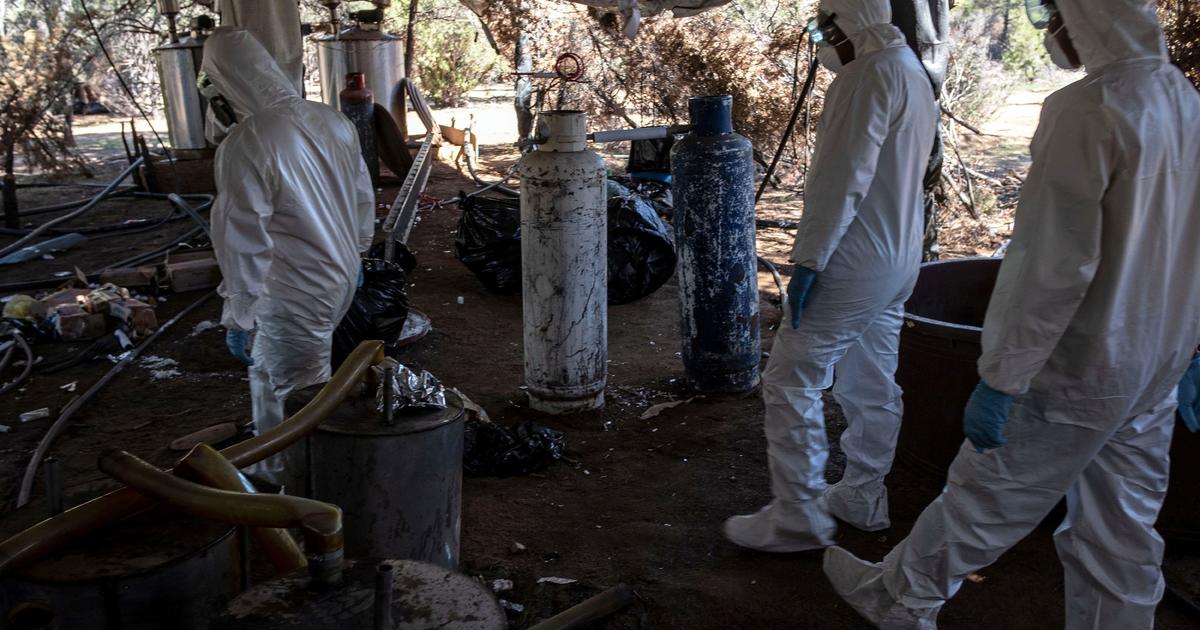Mexican soldiers found a total of 50 meth labs in the first two weeks of June, Mexico’s army said Monday. The small labs were mainly located in low woods around the state of Sinaloa, home to the cartel of the same name.
The army said in a statement that in just three days, June 10-12, troops found 19 labs in Sinaloa.
The soldiers seized almost a thousand drums or plastic containers with chemicals. They also found a total of 32 52-gallon chemical reaction chambers, or cookers, used to produce methamphetamine.
Mexican cartels export tons of extremely pure meth to the United States each year, sometimes in liquid form. Last week, U.S. officials seized 371.74 pounds of methamphetamine at the U.S.-Mexico border.
In April, President Andres Manuel Lopez Obrador confirmed that Mexico had dissolved a special unit trained by U.S. authorities to fight drug cartels because it had been infiltrated by criminals.
Mexican Army experts walk inside a clandestine laboratory of crystal meth near La Rumorosa town in Tecate, Baja California state, Mexico on August 28, 2018.
GUILLERMO ARIAS/AFP via Getty Images
Thieves steal 20 containers loaded with partly refined gold and silver ore
Thieves broke into a freight storage area at the Pacific coast seaport of Manzanillo and stole 20 freight containers loaded with partly refined gold and silver ore and television sets, the Mexican Employers Federation said Monday.
José Medina Mora, president of the federation, said the large-scale robbery was a sign of rising crime in Mexico.
“There is a growing lack of safety, and this is a sign of what is happening in the country and it requires that authorities take action,” Medina Mora said.
The state of Colima, where Manzanillo is, has not officially commented on the June 5 robbery.
But Horacio Duarte, the head of Mexico’s customs service, confirmed the robbery and said organized crime was involved.
“This was a very serious organized crime operation,” Duarte said.
According to local press reports, about 10 armed thieves forced their way into a private freight dispatch yard near the port, subdued employees and then took several hours to search for the shipping containers they wanted.
The thieves then apparently hooked up the containers to trucks and drove way with them. No sign of the containers, or their contents, has been seen since.
Freight theft is a serious problem in Mexico, but it usually involves thieves hijacking one truck at a time on highways – not driving off with 20 freight containers.
Articles like television sets are usually quickly sold off in the country’s extensive black markets, but it was unclear where thieves could sell tons of partly processed gold or silver ore. Any refiner would be likely to ask questions about where it came from.
Prosecutors and police in Colima have had a more pressing problem on their hands, with residents blocking roads to protest kidnapping and killing of local people. Two police officers have also been shot to death so far this month in the state, which has been dominated by the powerful Jalisco drug cartel.
Last month, Mexican authorities captured a suspected leader of the powerful cartel. The Department of Justice considers the Jalisco cartel to be “one of the five most dangerous transnational criminal organizations in the world.”
